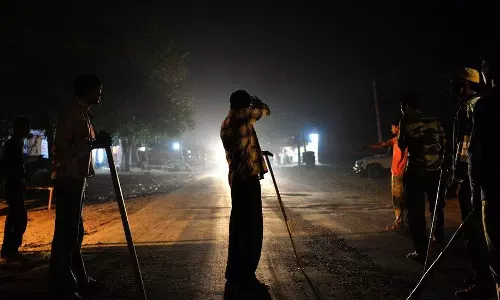
Was keen to join active politics: CJI NV Ramana
text_fieldsRanchi: Addressing Justice SB Sinha Memorial Inaugural Lecture in Ranchi, Chief Justice of India NV Ramana said that he was enthusiastic about joining active politics, but destiny desired otherwise, Asian News International reported.
He said that the decision to give up something for which he had worked hard was not easy.
Regarding the pendency of cases, CJI pointed out that the non-filling up of judicial vacancies and not improving the judicial infrastructure were the prime reasons. He also expressed his disappointment over the false narratives of the lives of judges.
He said that he strongly advocates the need for a revamp of the judicial infrastructure, both physical and personal, to enable judges to function to their full potential.
Further, he expressed concerns over the security of judges after their retirement.
He said that physical attacks on judges are on the increase these days. Judges also have to live in the society, along with the people they convicted, without any security or assurance of safety, he said. He said about the security given to professionals from other occupations due to the sensitivity of their jobs.
He said that Politicians, bureaucrats, police officers and other public representatives were provided with security even after retirement, but the same is not extended to judges.
Later, he came down on Media. He said that several media organisations in the country were running Kangaroo courts and called their behaviour "biased", "ill-informed", and "agenda-driven".
Justice Ramana said the media often passes verdicts on issues that even experienced judges find difficult to decide.
"Of late, we see media running kangaroo courts, at times on issues even experienced judges find difficult to decide. Ill-informed and agenda-driven debates on issues involving justice delivery are proving detrimental to the health of democracy," he said while speaking at an event at the Jharkhand high court in Ranchi.
"There are concerted campaigns in social media against judges. Judges may not react immediately. Please don't mistake it to be a weakness or helplessness," Justice Ramana said.
"New media tools have the enormous amplifying ability but appear to be incapable of distinguishing between the right and the wrong, the good and the bad and the real and the fake," the Chief Justice said.
"Ill-informed and agenda-driven debates on issues involving justice delivery are proving to be detrimental to the health of democracy," he added.
The Chief Justice said biased views being spread by the media were weakening democracy and harming the system. "In this process, justice delivery gets adversely affected," he said.
"By overstepping and breaching your responsibility, you are taking our democracy two steps backwards," Justice Ramana said.
Print media still has a certain degree of accountability, the top judge said, adding, "Whereas electronic media has zero accountability as what it shows vanishes into thin air. Still, worse is social media."
Urges the media to self-regulate, he said, "It is best for the media to self-regulate and measure their words. I urge electronic and social media to behave responsibly. Electronic media should rather use their voice to educate people and energise the nation."
















